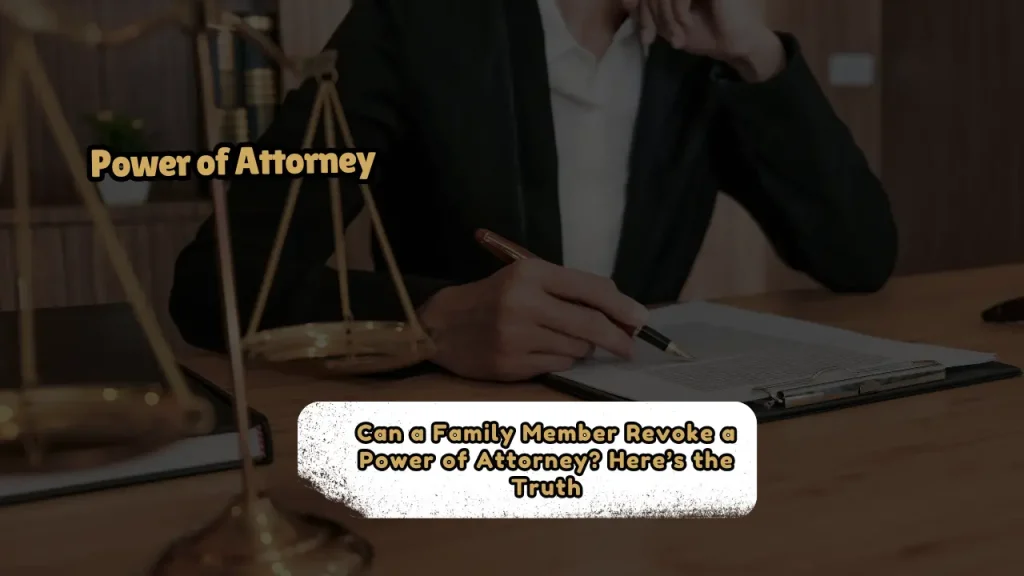Can a Family Member Revoke a Power of Attorney? Here’s the Truth
Generally, only the principal (the person who created the POA) can revoke a power of attorney. Family members cannot revoke a POA on their own—unless they have legal authority, such as guardianship, or can prove the agent is abusing their power.
Imagine This Scenario
Your elderly father granted his new wife power of attorney (POA) six months ago. Now, she’s draining his bank account, refusing to let you visit, and ignoring his medical needs. You’re desperate to revoke her authority—but can you?
This situation is alarmingly common: 1 in 10 seniors experience financial abuse, often by someone they trust (National Council on Aging). Understanding your rights as a family member could mean the difference between protecting your loved one and watching their assets vanish.
Table of Contents
Who Actually Has the Power to Revoke a POA?
1. The Principal (If They’re Mentally Competent)
The person who created the POA can revoke it at any time, as long as they’re mentally capable. This applies even if the POA is labeled “durable” or “irrevocable.”
How to Revoke:
- Submit a written revocation (signed and notarized).
- Notify the agent and third parties (e.g., banks, doctors).
- Create a new POA if desired.
Key Exception: Some states (like Texas) allow oral revocation if witnessed, but written is always safer.
2. Family Members (Under Specific Conditions)
Family members cannot revoke a POA unless:
- The principal is incapacitated and you’ve obtained guardianship through court.
- The POA document includes a springing clause allowing revocation under defined conditions (rare).
- You can prove agent abuse (e.g., fraud, neglect) and get a court to intervene.
Example: In California, adult children can petition to revoke a parent’s POA under Probate Code § 4131 if the agent violates fiduciary duties.
When the Principal Lacks Capacity: The Guardianship Route
If your loved one is incapacitated and the agent is misusing their power, you’ll need to:
- File for Guardianship: Prove to a court that the principal can’t manage their affairs.
- Present Evidence of Abuse: Bank statements, medical records, or witness testimonies.
- Request Revocation: The court can terminate the POA and appoint you as guardian.
Drawbacks: Guardianship is costly (2,000–5,000 in legal fees) and time-consuming (3–6 months).
State Spotlight:
- Florida: Requires a medical exam to confirm incapacity (Fla. Stat. § 744.331).
- New York: Prioritizes spouses/adult children as guardians (Mental Hygiene Law § 81.19).
4 Red Flags That Justify Revocation
Courts may revoke a POA if the agent:
- Steals Assets: Transfers funds to personal accounts.
- Ignores Medical Needs: Withholds necessary care.
- Isolates the Principal: Blocks family contact.
- Acts Against Wishes: Violates the principal’s documented preferences.
Real Case: In Ohio v. Henderson (2022), a son’s POA was revoked after he sold his mother’s home without consent and gambled away the proceeds.
Related article for you:
Can a Power of Attorney Force Nursing Home Placement in Texas?

How to Legally Revoke a POA (Step-by-Step)
If the Principal Is Competent:
- Draft a Revocation of Power of Attorney form (state-specific templates here).
- Sign and notarize the document.
- Notify the agent in writing (certified mail recommended).
- Alert all third parties (banks, hospitals, etc.).
- Destroy all copies of the old POA.
If the Principal Is Incapacitated:
- Gather evidence of abuse (bank records, emails, photos).
- Consult an elder law attorney to file for guardianship.
- Request an emergency hearing if there’s imminent danger.
- Present your case to the court.
Pro Tip: In Pennsylvania, you can file an emergency petition to revoke a POA within 72 hours if abuse is urgent.
What If the Agent Refuses to Relinquish Control?
Even with a valid revocation, some agents refuse to comply. Your options:
- File a Police Report: For financial exploitation or elder abuse.
- Freeze Accounts: Work with banks to block the agent’s access.
- Sue for Damages: Recover stolen assets through civil court.
Example: A Texas court ordered an agent to repay $250,000+ in stolen funds after a sibling proved misuse of a POA (Estates Code § 751.101).
Common Mistakes to Avoid
- Assuming Verbal Revocation Is Enough: Most states require written notice.
- Forgetting to Notify Third Parties: Banks might still honor the old POA.
- Delaying Action: Evidence disappears fast—act immediately if abuse is suspected.
Stat: 71% of financial exploitation cases involve family members (CBS News).
State-by-State Revocation Rules
| State | Key Law | Revocation Process |
| California | Probate Code § 4151: Requires written revocation. | Notarized form + notice to agent. |
| Florida | Fla. Stat. § 709.2110: Allows oral revocation with two witnesses. | File notice with the court clerk. |
| New York | Gen. Oblig. Law § 5-1511: Third parties must accept revocation in writing. | Serve agent via certified mail. |
Protect Your Loved One: An Action Plan
- Document Everything: Keep records of abuse, conversations, and expenses.
- Secure Financial Accounts: Freeze joint accounts or credit cards.
- Contact Authorities: Adult Protective Services (APS) can investigate.
- Update Estate Plans: Create a new POA with safeguards (e.g., co-agents).
Hotline: Report elder abuse at 1-800-677-1116 (National Elder Abuse Hotline).
Final Takeaways
- Only the principal can revoke a POA unless they’re incapacitated.
- Family members must prove abuse and seek guardianship to revoke.
- State laws vary—consult an attorney to determine local rules.
Need Help Now?
- Legal Aid: Find low-cost attorneys via LawHelp.org.
- State Bar Associations: Referrals for elder law specialists (e.g., CA State Bar).
- Elder Abuse Hotlines: Immediate intervention for at-risk seniors.
About the Author

Sarah Klein, JD, is an experienced estate planning attorney who has helped clients with wills, trusts, powers of attorney, and probate matters. At All About Lawyer, she simplifies complex estate laws so families can protect their assets, plan ahead, and avoid legal headaches during life’s most sensitive moments.
Read more about Sarah
